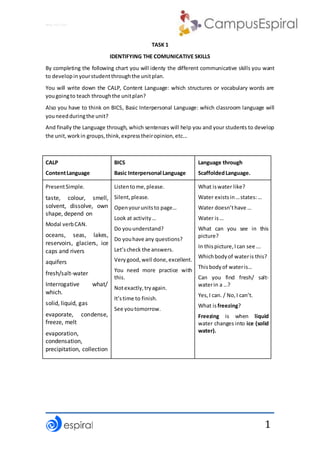Module 2 activity communicative skills raquel serrano v2
- 1. Why not CLIL? 1 TASK 1 IDENTIFYING THE COMUNICATIVE SKILLS By completing the following chart you will identy the different communicative skills you want to developinyourstudentthroughthe unitplan. You will write down the CALP, Content Language: which structures or vocabulary words are yougoingto teach throughthe unitplan? Also you have to think on BICS, Basic Interpersonal Language: which classroom language will youneedduringthe unit? And finally the Language through, which sentences will help you and your students to develop the unit,workin groups,think,expresstheiropinion,etc... CALP ContentLanguage BICS Basic Interpersonal Language Language through ScaffoldedLanguage. PresentSimple. taste, colour, smell, solvent, dissolve, own shape, depend on Modal verbCAN. oceans, seas, lakes, reservoirs, glaciers, ice caps and rivers aquifers fresh/salt-water Interrogative what/ which. solid, liquid, gas evaporate, condense, freeze, melt evaporation, condensation, precipitation, collection Listentome,please. Silent,please. Openyourunitsto page… Look at activity… Do youunderstand? Do youhave any questions? Let’scheck the answers. Verygood,well done,excellent. You need more practice with this. Notexactly,tryagain. It’stime to finish. See youtomorrow. What iswater like? Water existsin…states:… Water doesn’thave … Water is… What can you see in this picture? In thispicture,Ican see ... Whichbodyof wateris this? Thisbodyof wateris… Can you find fresh/ salt- waterin a …? Yes,I can. / No,I can’t. What isfreezing? Freezing is when liquid water changes into ice (solid water).
